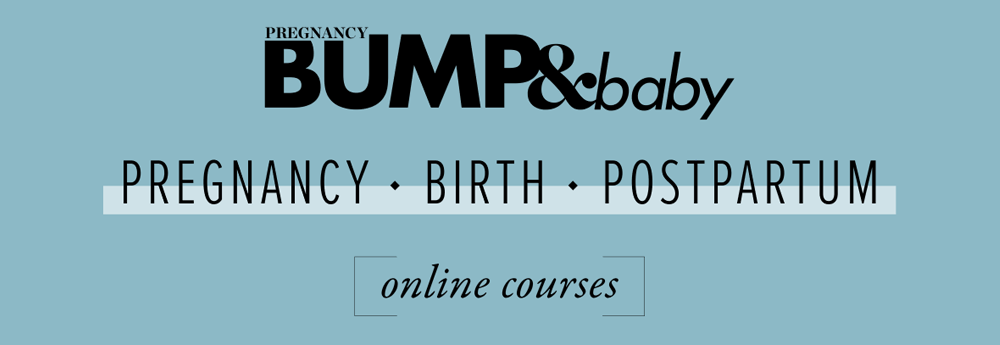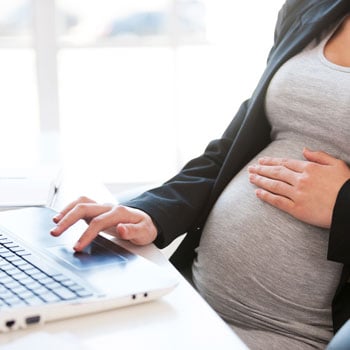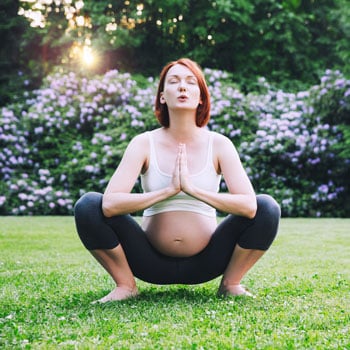
Think you might be pregnant, but not quite sure? Before you reach for a pregnancy test, take a look at these early signs and see if any feel familiar, writes Penny Voigt.
1. Darkening areolas
During pregnancy, and even as early as a week or two after conception, you may notice your areolas (the area surrounding your nipples) begin darkening. It’s a result of surging pregnancy hormones as your body prepares your breasts to feed your baby. Totally harmless and very common, it’s probably one of the rst changes to your body that you’ll notice. Have no fear if you develop bumps on your areolas. Called Montgomery tubercles and similar in appearance to goosebumps, these little bumps keep your nipples lubricated, something you’ll be grateful for when you’re breastfeeding.
2. Frequent weeing
Human chorionic gonadotropin (hCG), also called the pregnancy hormone, is responsible for this one. Once the embryo implants itself in the uterus, hCG is released, ooding your body with the hormones needed to sustain your pregnancy. The result is a need to wee more often. An increase in hCG levels also results in a positive on your home pregnancy test. HCG increases the blood ow to your kidneys, making them more ef cient during pregnancy, which is a good thing when you’re weeing for two.
3. Sore breasts
Swollen and sensitive breasts are a common pregnancy symptom. It feels a lot like when you get your period, only worse! Breast tissue is particularly hormone-sensitive and as progesterone and hCG hormones start ooding your body, increased blood ow to your breasts can make them swell and feel heavier than usual. Wear your most supportive bra or get tted by a professional. Remember to leave a little extra room as they are likely to keep growing.
4. Spotting
From about 5 to 10 days following conception, light bleeding may occur. Called “implantation bleeding”, it’s a sign that the embryo has embedded itself in your uterine wall. Spotting can be similar to a period, only much lighter and shorter than normal. It should only happen after conception, so if it continues, get checked out by your doctor or midwife.
5. Cramps
Tummy aches and cramps, similar to those you get just before your period, are triggered by the embryo implanting itself into the uterine wall and your uterus stretching to prepare itself for the next nine months.
6. Headaches
In the first few weeks of pregnancy, increased blood volume can trigger frequent, mild tension headaches. As you body adjusts to the elevated hormone levels, these should ease up. Be sure any pain medication you take is safe for pregnancy.
7. Missed period
Your period comes each month if your egg isn’t fertilised. So if you’re missing a period, there’s a good chance you’re pregnant. It’s the most obvious sign of pregnancy but not all women miss a period when newly pregnant. If you’re usually fairy regular and you’ve missed one, try taking a pregnancy test.
8. Fatigue
Hit a sudden slump and just too exhausted to keep up with your usual activities? Your loss of energy is down to hormones and your body’s efforts to nurture your growing baby’s development. As early as two weeks following conception, your body starts using up your calories to feed your growing baby, wiping out your own energy stores. Take time out to catch up on the zzz’s with an extra few minutes’ sleep in the morning or a late-afternoon power nap.
9. Food cravings
Some believe that food cravings are simply your body’s way of letting you know what it needs. Research shows that around 90% of pregnant women experience food cravings. Avoid “eating for two”; choose healthy options of empty calories and bump up your nutrient intake.
10. Nausea
Morning sickness can strike fairly early in some pregnancies, but generally it starts around week six. And for some pregnant women it’s not limited to mornings only! There’s no clear reason why nausea and vomiting occurs in pregnancy, although it’s likely linked to changes in hormones. Around 50 to 90% of women suffer from some form of morning sickness. To minimise it, try nibbling on dry crackers before getting out of bed, eat smaller, more frequent meals, and sip tea without milk, or drink ginger ale.
11. Smell sensitivity
If everything smells a little off to you, there’s a chance you could be expecting. Although no scientific reason exists, many women report a smell sensitivity during pregnancy. Stay away from strong-smelling foods, wash clothing more often, try using unscented toiletries, and get your partner to take out the rubbish.
12. Backaches
This one is likely to continue throughout your pregnancy, as your body shifts and changes to accommodate your growing baby. If you don’t normally suffer from back pain, it could be a sign that your ligaments are loosening up.
13. Bloating
Many mums-to-be swell up early on as a result of the boost in progesterone and oestrogen. Progesterone helps relax smooth muscle tissue, including that in your gastrointestinal tract. As a result, your gut works slower to allow your body more time to digest nutrients for your growing baby, leaving you feeling bloated and gassy. Eat smaller meals more often and avoid foods that give you gas.
14. Constipation
Those same hormones that leave you feeling bloated and swollen can cause a few other problems too. Because your digestive system slows down, food may not pass through as quickly, and you could end up being constipated.
15. Mood swings
It’s no wonder you’re all over the place, with pregnancy hormones ooding your body and causing sore breasts, fatigue, constipation, and headaches. Mood swings are a normal part of pregnancy and you’re likely to feel a little hormonal in the early stages. It’s down to your body adjusting, obviously.
16. Body temperature
If you’re actively trying to get pregnant, you may have been tracking your body temperature to pinpoint ovulation. Typically, it’s about a half a degree higher when you’re ovulating until you get your period two weeks later. If it stays elevated beyond the two weeks, it may be a sign that you’re pregnant.
17. Dizziness or fainting
Sounds like something out of a movie, when the leading lady discovers she’s pregnant and swoons. But it’s actually based on reality. Low blood sugar or blood pressure in the early stages of pregnancy can cause you to feel dizzy and even faint. Ensure you stay well- hydrated and eat small meals, more frequently, to avoid a woozy episode.
BUMP&baby
BUMP & baby is New Zealand’s only magazine for pregnancy and early babyhood. Our team of mums and mums-to-be understand what it’s like to be pregnant in this connected age, and that’s why BUMP & Baby online is geared toward what pregnant women and new mums really want to know.
Other articles of interest
Maternity leave: 8 essential questions answered
Parental leave entitlements can be a bit confusing. Here’s a quick guide to what you need to know.







